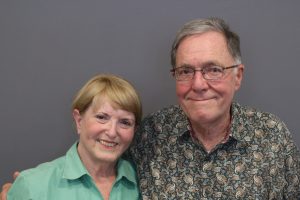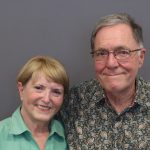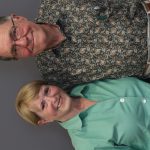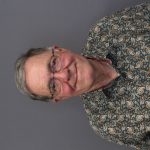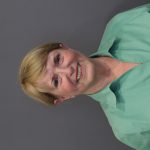Joanne Bodner and Andrew "Drew" Bodner
Description
Joanne (71) and her husband Andrew (77) talk about how both of their families were part of the homestead program in Oklahoma for Joanne's grandmother and Montana for Andrew's grandparents.Subject Log / Time Code
Participants
- Joanne Bodner
- Andrew "Drew" Bodner
Recording Locations
Homestead National Monument of AmericaVenue / Recording Kit
Tier
Partnership
Partnership Type
Fee for ServiceSubjects
Transcript
StoryCorps uses Google Cloud Speech-to-Text and Natural Language API to provide machine-generated transcripts. Transcripts have not been checked for accuracy and may contain errors. Learn more about our FAQs through our Help Center or do not hesitate to get in touch with us if you have any questions.
00:03 Hello, my name is Joanne car records and my married name is bodnar. And as of today, I am 71 years old. This is August 2nd. 2015. And we are at the homestead National Memorial in Beatrice. Nebraska were very happy to be here and I'm here with my husband who will introduce himself.
00:34 Hello, my name is Andrew and I go by Drew last name bodnar age of 77 years old. Today's date is August 2nd 9 to 2015 where it's at Homestead Museum National headquarters National Monument of America is where we are in Beatrice, Nebraska.
00:57 I think we want to talk cuz my relationship.
01:04 We wanted to talk about Drew. I think how we've been talking about how fortunate we are to both have had grandparents whom we knew who were homesteaders and we talked many times through the year. What what a blessing that is to have had those memories and to be able to have those memories of our grandparents who were homesteaders similarities between the two of us and they happened about the same time also about 18 92 93 or so. So I will I will I want to talk today about my my father's mother Bertha. Her name was her name my grandmother birth the car and I'm very fortunate that my middle name actually is car. My maiden name is records. So I've always been very proud throughout my life that Bertha was my grandmother and that my middle name.
02:04 Is her maiden name, but I've often wondered what it is that made her into a homesteader. It was somewhat unusual in those days and you know from being in the West in the midwest how what it must be like for a woman in her a single woman in her twenties to have Homestead in the late eighteen hundreds early 1900. That's right. She did but you know before that she really came by this homesteading naturally. I think Bertha's was born in Oregon, Missouri and her parents her mother her mother's family were off early settlers some of them immigrants from Ireland her Father Andrew Carr.
03:04 Was in the Union Army during the Civil War. So I'm proud to say that I had a great grandfather who was in the Civil War Rolling Hills old houses always beautiful there and he was sent to Fort Laramie, Wyoming. So he was he fought Indians. He defended the telegraph. So I'm I'm saying this because I think my grandmother birthday came by this pioneering Spirit very naturally. It was a progression for her when her parents were married in Oregon Missouri, and she was born she was about 10 years old. She had a couple of brothers and sisters and they were able to land a homestead in southern Kansas her parents homesteaded in southern Kansas when she was about 10 years old down by Wellington. We've been there several times.
04:04 The dimmer buried are in a Grade the cars and they lived there on that Homestead and in the early 1890s probably about eighteen ninety-three the government opened up the northern part of Oklahoma to White Settlers. Of course, the Indians had been forced into Oklahoma and at some point the government opened up the land that they were on to White settlers and is hard to imagine our ancestors, but with the spirit of the time they were anxious to get the land, but she wanted to be a to be a homesteader at that time, but she was too young and 1893. That's when the main Oklahoma Land Rush was it when we seen to make pictures about where everybody is lined up on the border of Kansas and Oklahoma and charging with their wagons and horses.
05:04 Saw that she did she actually talked to her about it about it. I can remember her telling me about it. She was only 19 years old and she was a schoolteacher down in this little town in Kansas and the family she lived with took her to this land rush and they all waited for the guns to go off and people went rushing across the border. She had this bright red hair and she told me about this one wagon that lost control of the horses and then went racing by her and a man was standing on that wagon pointing at her saying looks at woman has has her hair on fire and I always thought that when I was a kid, I thought that story was so funny, but she went back to teaching school and her father who had been in the Civil War never regained his house after the war and she took care of him he died.
06:04 Around 1900 and in 1901 the government opened that he was young years old. Do you know this homesteading so much attention of Civil War right now. They're trying to do this right? I'd forgotten about that when he was discharged from the Union Army from Fort Laramie and he had a a buddy of his bought a ranch and a Down by Laramie, Wyoming and I bet he became a little bit concerned because the Indians there were so many Indian Uprising so he's sold out to his partner and went back east and that's when he landed in Oregon, Missouri met my grandmother's mother and here she is now down in Oklahoma. She was
07:04 Able and 90 1893 1903 when the government opened the southern part of Oklahoma. She was they have a lottery instead of the land rush ahead learned their lesson to guess but she put her name and she registered for that and she would have been in her middle twenties still single and you know, her number was drawn and she got to make a claim. Yes. Yes, and that she was able to make a claim in southern Oklahoma, and she she claimed her land at the land that she picked out was just north of what is now Walters, Oklahoma and the so I it is also fat Druid you you at your grandparents also have really interesting stories about how they even got to the point of homesteading.
07:59 Cuz you know we've been there to the Soul. Republic Republic really close to Poland 1868 10 members at Rolling Hills there an Austrian Empire, but then had my grandfather was born in him out of this equation was 20 kilometers from Ukraine that's on the Far Eastern Eastern top part of the Ukraine 20km by the story because his Landeros the land around those kind of flat.
08:51 But anyway, I think they both left maybe about the same time for the United States, but then I don't think they mentally got over here. You don't know for sure. I don't know for sure. So interesting is remember their self forested areas and I realize explain the large animals over there they had and he has tried to make sure I understood this but I did because they were wolves that they were explaining that they had over there. It's kind of still a wild area now he is right now's his much much the same and the old ways to remember the paperwork milking the goats when we were there like grandparents did the same thing, you know exactly where your grandparents landed when they came to the United States.
09:52 Pennsylvania just where it was and
09:55 Is that where they were married? Yeah, they just had a suitcase walking away from The Villages and then their relatives and parents are waving them. Goodbye and some of them and the family must have gave the money to have enough money to get across. My grandmother was at 22 my grandfather's 26. So when they were remarried there and up my grandfather worked in the mines there briefly before they left to go to Belmont and you know why they decided maybe they you heard there was land free land in the West
10:52 Already have my grandmother had a sister and a brother who came to the United States settled somewhere out there and I suspect and so a call that my grandfather had four siblings. I think they all stayed in the Old Country. Maybe but maybe not. Maybe one could have come here, you know, once they got to Montana they weren't in belt very long before they homesteaded is my understanding told here for a while then my grandmother. I think it was saving their money to to buy the Sun.
11:36 I ran my grandfather is going to have another name of My Vato that's from the old country on that. We don't know why we don't know. I really don't know why that was that must not have been too. Uncommon though. I think, you know people leaving the old country might had my puppy had many reasons for changing their names. Will she she was single when she homesteaded but this this thing about having brothers and sisters that I think is a common theme so often these were family-type Endeavors, and I know when my grandmother went her number was called and she
12:36 She was going to be able to stake a claim in the southern part of Oklahoma. She got on a train in Wichita Kansas that we have to remember. This is not a modern fast train. This is old train and I can almost see her because I remember her so well exactly and I remember her so well she lived with his she talked about getting on that train and she took the train to to Lawton Oklahoma, which was a really bustling town about that time. There was so many people coming in and out Dino claiming land and she had to go out to pick out her Homestead, but she talked about that. She stayed in what was then a tent Hotel it was essentially a hotel made out of canvas and she had her own room, but it had canvas walls and she was asleep.
13:36 That night as sleep. I suppose on some kind of a bed on the floor and she looked over at that canvas wall at the bottom. It didn't quite reach the ground and she could see this man's leg slipping accidentally under that that tent wall and she is she talked about how startled she was better course. The man was asleep. He didn't know what he was doing and Eddy Raven a just you know, that the the grit that it took for her to do that, but I can I can see her doing it and dance she rented was able to rent a wagon and a driver to take her out into the countryside down there and she wound up picking out a piece of land north of what is now Walters Oklahoma. And once again when I say a wagon this is not just like hiring a taxi cab. It would have been a wagon and a driver with horse.
14:36 He is a very rough ride of course and and she would talk about how dusty it was and but she was so happy to to get that land. But the thing is is that her brother. She had several Brothers still in Wellington Kansas on the Old Homestead and one of her brothers. They were not able to get free land through the Homestead Act but one of her brothers was able to purchase some land that I joined hers. And so he moved there and of course you had to build a house or some kind of a house or dwelling you had to live on the land for 5 years and and make improvements and so forth. So they built their houses these little Hut these little cabin Huts facing one another and they actually had the property line going right down the middle between them and her brother than farmed the land and she took care of the house and of course she
15:36 Worked in the fields also and then later she had two other brothers who came down there to help so it was a family Endeavor and while my grandmother eventually did leave one of the brothers actually stayed there and had his family and it was very much a family adventure and I think there's the same way with your your family Drew in Montana. Same age. Maybe in their 20s. Yes. Yes. I think they were a little bit younger than she was and yes. Yes, she was she was but you know that my father was actually born on this Homestead as so I guess I could say that my father to what is a homesteader. He know he never talked about it nearly as much as she did and I I think it might be because his life was so hard. My grandmother talked a lot about it. I was
16:36 Young but I remember her talking about it. We'll just everything I'm telling you. She talked about these things. She didn't talk about that. I don't know if he was born at home or in the hospital. He just didn't talk much about it. What the one thing he did talk about. His father died when he was about 9 years old birth of my grandmother birth is husband died when my father was 9 years old and my father would talk about hopping on trains remember Drew and he would talk about hopping on trains and going out into the country in the summer and yes and shucking corn and taking jobs like that and he talked about his uncle Delbert who taught him how to pick up and down on the farm down in Oklahoma he to gave him a tip to just keep picking down the road don't look at the end of the road because if you do you'll see how far it is and you'll never get to the end. Just keep your head down and keep picking the cotton.
17:36 And it'll go a lot faster that way and so it doesn't sit life is hard. My father didn't talk much about it. But you see it was still a homestead at that time. It was he was born in 1905 Oklahoma what was not a state and it was will know and it was not until 1919 that his mother took him up to Independence Missouri with to live with his grandparents. That's right. That's right. And I drove him back if he if you remember that Drive Irving driving down there and it was touching to me to have him look around and he could say oh, there's Cache Creek we were ghosts with the kids we go swimming there and he said well, that's where we used to shoot Jackrabbit jackrabbits. And so he would talk about it towards the end of his life, but I think it was just such a hard life.
18:36 My grandmother the one who actually Homestead it was much more talkative and and communicative about homesteading and life on the on the farm there. What will my key? I remember a grandparent is your grandmother Bertha's daughter. She as a child both migrant both my parents when my father and my aunt remembered when they brought Geronimo Geronimo was the hold out of the Apache Indians in that that area a very brave soldier who is much revered and it when he was caught finally he was sent to the east but towards the end of his life. He was sent back to Fort Sill which is in is in
19:36 Oklahoma and my grandmother remembers Geronimo being brought back to Fort Sill which is where he died. So to me, it's a rather sad story. She didn't say too much about it, but she remembered everybody standing and watching him without much empathy without it without much thought as to what this man has been through what he had lost at the expense or I should say to to the Improvement of of the white people who took the land. I'm not criticizing that necessarily I try to put myself back into that erupt and realize that that things were very different than the stinking was quite different than we do you have looking back. Right? Right right before you remember your grandparents and I I wanted to say that I have been to Montana so much with you and I want you to talk about the homestead.
20:36 I will in just a minute. I remember Aunt Dorothy was holding. Her mother's hand hold your mother's hand. That's right. She would have been probably not more than four or five years old and my father only a couple years older and so these so yes, yes. What do you remember about your grandparents and what you remember about the homestead because you were actually there watching them Farms. My grandparents have three daughters and five sons and one daughter died done riding a wagon when they pray chickens flew off in front of the wagon and scare the horses and she fell off the back of it and she was born in 1899 and that happened in 1903.
21:36 I'd mention about the mining town that they lived in Belt Montana and Pennsylvania when they were there but his understand the story was he discovered that the miners were spending a lot of money there in the mines and so he had to
21:54 Palace Saloon there and then it was shortened shortly after my grandmother wanted to go to the homestead and so should save some money to be able to buy the house. They're so they moved on to the hundred sixty acres in Judith Basin county is a large largest crate to hurt a buffalo herd United States that was left at big buffalo herd area is about maybe 15 miles from Belt Montana. And the thing about this is Charlie Russell the artist his Trail was just through there through for their house was he would ride horseback on that trail and visit them and and I one time I know my father show me a pen and ink that Russell is given to those Buffalo so much.
22:54 There you have to think of the times that I actually saw their the coil lamps burning and the smells and the sites in the sounds of is a use that was back in the forties when I was a child. And of course Prairie, there's kind of interesting as if there's a little Belt Mountains and then to the North or the highway mountains, but in between his kind of prairies with cool, he's a very hard to farm person has a little valleys places and down in those place to begin workout green to be able to stream in there. And that's where it was nice big. They would have had to build a house 2
23:51 Quit job at the bottom for it, walk in and the top floor you can walk to from the higher-level the hill and then there was none.
24:03 Balcony reports kind of on two sides of it, but it was kind of nice house the time and the house is still standing going up was it?
24:17 They had done the younger child slept at the foot of the bed. And then the two older children slept at the head of the bed and then his children crew will gradually moved around at the head of the bed. So they had three children and a bad at the same time and bellowing to sleep with his foot so I can remember even when I was there in the forties and fifties saying that while I was for the Buffalo herds would scratch their backs in the soil and it was so compacted the grass would grow differently to be greener and it be a circle and maybe 15-20 ft diameter there for the Buffalo would have worn that down scratching your back in those areas and fact for the hopes that is there a bluff right there in front of the house, maybe fifty to seventy-five feet away.
25:17 Down that to this day because he rattlesnakes go. Right? Right, right yam. Buffalo Jump on just huge during World War II, that's where the government would come in and scoop out all those bones during World War II lot of those Indian relics of the time that they scooped up the landscape their how on Earth did they they Farm I would have loved to seen the difference between the way it is now and then right, of course I can remember those days when
25:57 They use the horses in the rakes and you know that my grandparents would start out 160 Acres, but they kept buying ranches of other ranchers who have done make it but back in those days or so many ranches and people out there than there are now the school house is maybe a mile or two away in a little Schoolhouse in different places with so many ranches that my grandparents bought those ranches of the people that so many people didn't make it at the foothills of the mountains and there's some trees there and I know that. Damn there's a sweater Ranch Pools by so weak in the mornings them horse teams to be out there with the rakes in the seclusion. And of course all those horses can be harnessed Endicott.
26:51 And the hardest and then do a lot of work involved in doing that in the morning to get them ready to go. And I remember the sounds of the horses in the middle and waiting to get started for the day, but then they would start to going on that Hillside up there in the mountains. You say mowing. What was the more like it on the side of it? Maybe 5 to 6 ft long on the side Jon Boat horses, but not motorized that. You do when buying these ranches where my grandparents day went from 160 acres to 16,000 acres and then they had sold off maybe 4,000 up at the send their three children to school and my aunt went to Washington state became they had a business agreement, secretary the two
27:50 Brothers had done engineering school electrical engineering school at Montana State in Bozeman. They both became electrical engineers the grade school, but he couldn't speak English then you'll have to the teachers beating until he learned how to teach you English and they walked a mile or to the school yesterday. Remember it was on Otter Creek there and done things to beat him to get him to teach Dad did also and he was who had become a licensing many states United States and its power plant design all over United States. He became a huge huge.
28:49 Countdown from The Humble beginning they I think they decided to make me to send three of them to school. They all got together with the family and Debra I suspect to send them to school still believe in education music as well. I remember my grandparents had it in Oregon near remember that Oregon that bottom they have that side to them and that they kept her old world ways. I think that seeing those horse-drawn wagons and the way they hate as much as I can do in the old country for a long time and I remember that the forties the teams of horses in the way that they value in education for their children is probably a pretty common one. I know that as I said my my grandmother Bertha's husband died
29:49 When my father was 9 years old and when he was about 14 his grandparents who lived in ended Independence, Missouri outside of Kansas City brought my grandmother Bertha and my father and my my aunt to live with them and from that point on they sent my father just school is almost exactly the same thing. They send him to college and eventually the law school and there would have been no way that he would have become a lawyer without that opportunity. He I think by growing up on a homesteading having a grandmother who was Homesteader grandparents who are Homesteader, he had already learned the discipline and the hard work but you know, you have to have an opportunity to and I believe that that's what my grandmother Bertha and her.
30:49 Did and homesteading was try to provide the opportunity for their children to receive an education that they it wasn't a it was a high thinking kind of a an idea. I mean that they were not being uppity or anything like that. They they simply knew that if a person has an education in life, they are able to provide for their families better and live a better quality life. So that was the reason for it yet among the people my grandmother. I'm sure your grandparents. I know your father my father at my mother too had grandparents who were Pioneer Pioneers for sisters on Saturday.
31:40 Matching our parents. Well, that's right where they were and tweeze heard all these stories and for so many years but they were good friends and same qualities pretty much different different pass me. What are the other than actual engineer, but still the value of education and their discipline and achieving all of them something I would say about that. I remember about my grandmother Bertha that made her almost have to be a homesteader. She was so curious and even as an older person she lived with us and I remember she was always interested in everything. She was curious about everything. I recalled that my family was as was the first family on the Block to get a television and course. It was all black and white then and I can just still pictures.
32:40 Sitting in our living room with a bunch of kids. We were all sitting around the television and we were all just staring at this black and white test screen waiting for a program to come on out whether it was Howdy Doody or what it was. I don't remember but I can remember her sitting there right with all the other kids and looking back on that. I can see how how unique that was. She was always curious always interested always on the go but that's the Pioneer spirit that time from Oklahoma from being out there and putting that flag in the soil to place that the lottery right to fast forward to where she was sitting there watching a television now that. May I see what it is.
33:39 I at the space age change from where she started but she loved every minute of it and even as an older person she she travels she would get on a train go back to Oklahoma travel different places travel to visit my father at Kali she travel Oklahoma often to see her family. They are hurt when my father was in college. She would go visit him either at Missouri or he attended VMI also. Yes. I have a letter she wrote. I have a letter that my grandmother wrote to her family from Atlanta when I was born in Atlanta when my father was there during World War II working for the war department and my grandmother must have gone there to help my mother because I have a letter that my grandmother.
34:39 Mother wrote to her family in Oklahoma saying it's a little girl and they've named her car. She was so proud that they giving me what is very clearly we have these memories of our grandparents were there with them two words of English I ever heard you say was my boy and we've been there I think in 1942 and she wasn't feeling well we went on the train up to see her and I was just four years old. Now you has a person I can remember my grandparents when she was my Aunt Mary's porch at her house and a bed there and she was saying my boy in 20 words over her speaker.
35:39 I never talk about the old ways. I never heard my aunts and uncles and then went on to become an electrical engineer. Well, I think that we were still living in that house today so much liking so different really have a rich Heritage in a real treasure.
36:40 Grandparents and Beyond who were homesteaders and we were very big treasure.
